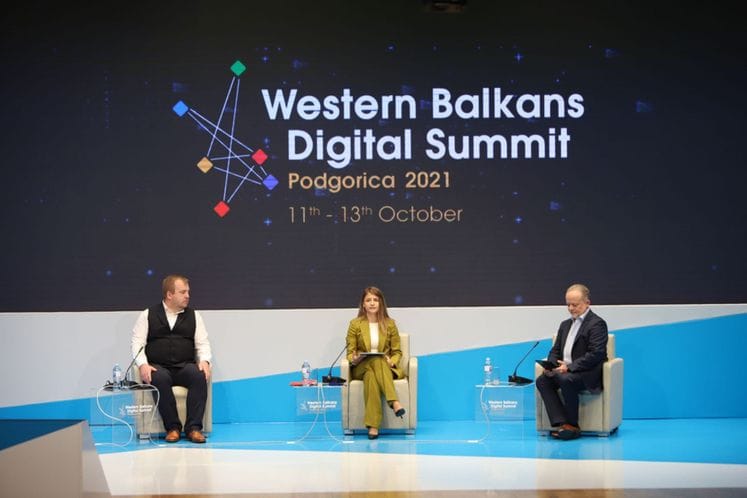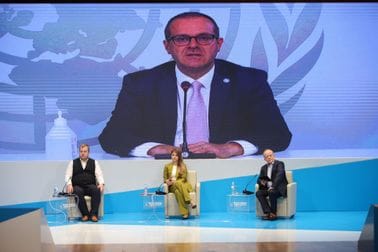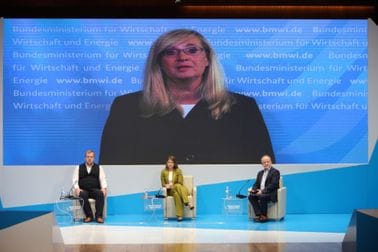- Government of Montenegro
Srzentić: We are committed to furthering the digit...
Srzentić: We are committed to furthering the digital transformation agenda

This was announced by the Minister of Public Administration, Digital Society and Media, Ms Tamara Srzentić, at the opening of the 4th Western Balkan Digital Summit.
She said that in that Ministry that she is the head of they have chartered an ambitious roadmap aiming to improve ways people interact with the government and ensure better access to services, all while building digitally empowered talent and workforce and fostering digital economy.
“Our team strongly believes in unlocking the power of government data and technology to spur innovation across our country and the region and enhance the quality of services to the people we serve,” emphasized Srzentić.
She said that the Digital Summit is taking place in a time of a globally challenging situation, and it is especially important to join forces in the Western Balkans, connect the dots, exchange experiences and lessons learned around the implementation of previously endorsed agreements and commitments, as well open new perspectives and areas for collaboration - all for the benefit and quality of life of our citizens.”
Speaking about the long-term economic recovery, Srzentić said that the people of Montenegro aspire to be supported and connected, all while maintaining their data safe, secure and accessible.
“Montenegro’s first Digital Transformation Strategy and Strategy of Cyber Security, which is fully aligned with the goals of the Europe's Digital Decade, is one of the major milestones of how we will make that happen”, Srzentić said.
She announced that the Ministry will launch “Montenegro Digital,” a small startup inside the government which will bring together some of the brightest digital talent with top civil servants in an effort to build more convenient, reliable, and accessible government services, saving the people of Montenegro both time and money.
“This fall we are launching the Digital Academy and establishing a standard and open sourced curriculum that reflects the core skills, competencies and capabilities needed to enable a truly 21st century digital public service, academia and civil sector equipped to confront new cross-cutting challenges”, said Srzentić.
The Secretary General of the Regional Cooperation Council (RCC) Majlinda Bregu, said that we will remember this year as the year of transformation in the Western Balkans, stating that the free roaming has been successfully implemented for the countries in this regon.
She believes that efforts to develop infrastructure are pivotal.
“All the countries of the Western Balkans are making progress, but we are still lagging behind the achievements pursued by our colleagues in the EU. When it comes to digital skills, two-thirds of people do not have enough skills to embrace the digital world.” One fifth uses the Internet to connect,” Bregu said.
She assessed that Digital Transformation is a process that requires investment in people, technology, systems and processes in order to improve the way people interact with the digital system.
“It is a process that requires us to think outside the box, in order to reap all the benefits of technological change,” Bregu said.
The Director General of DG CONNECT at the European Commission Roberto Viola, pointed out the importance of digital skills, stating that in ten years they will be necessary for the job.
“Everyone will need to master digital business skills. It is important to include the digital skills the curricula and the teaching system in order to face the challenges of the future in a successful manner,” said Viola.
He assessed that there is no digital society without the appropriate infrastructure and connectivity, stating that the Coronavirus pandemic showed that.
“That is why it is important that we, as Europe, achieve the goals by 2030 - that all citizens have access to the Internet at affordable tariffs, that they have high speed and that it is easily accessible everywhere,” said Viola.
State Secretary, Federal Ministry of Economic Affairs and Energy, FR Germany Claudia Dörr-Voss, said that the Digital Summit encouraged stakeholder dialogue and cancelled the roaming charges, which improved the quality of life of citizens in the region.
“It will be important for the governments of the Western Balkans to channel pre-accession assistance and sustainable projects. As digitization processes take place, we must ensure that all groups of society have the opportunity to be part of this process. This requires changes in public administration, “said Dörr-Voss.
Hans Henri P. Kluge, Regional Director of the World Health Organization for Europe, pointed out that data-based approaches are key to future pandemic preparedness, adequate responses and effective primary health care.
“It is essential to transform healthcare from a reactive system that extinguishes fires, as is the case now, to a system that anticipates potential points that a fire can occur and prevents it," Kluge said.
He pointed out that access to data alone is not enough, and that data needs to be replaced by a new culture in the health system that embraces data-based science and analytics.
“Digital transformation in the health system is one of the key elements for the accelerated process of European integration.” Now is the right time and we must have cross-sectoral and cross-border cooperation to ensure that the digital transformation fulfills the promise of safe, efficient and equitable health services for life after COVID 19," Kluge said.
The Deputy Secretary General for Digital Development, Ministry of Economic Affairs and Communications, Estonia Siim Sikkut, said that the transformation means changing the way we work, realizing that this is the essence.
“If we want to have good public services, we must have the ones that work best for the users. It is a constant work. If we want to have good policies, we have to have good data. That means good data quality. All these processes must be established, that is why we need regulations,” Sikkut stated.
He assessed that it is important to first establish the basis in order to be ready for newer things and more ambitious projects.
The message of digital Estonia is that even though we don't have all the resources, the perfect plan, just start. “ Even small things in the right direction will make a big impact," Sikkut said.
The Digital Summit of the Western Balkans 2021 is being held as part of the Berlin Process and as an initiative of the Regional Cooperation Council, and the importance of the summit has been confirmed through the new four-year action plan 2021-2024 for the Common Regional Market (CRM).
The host and organizer of this year’s conference is the Ministry of Public Administration of Digital Society and Media on behalf of the Government of Montenegro, while the general sponsor is the company M: TEL.
Gallery
![gallery.media[0].alt](https://media.gov.me/media/gov/2021/10/11/163394887278d7ylq7vffywaug.jpg?cacheControl=1633966880)




